Izzy Paskowitz Uses Surfing to Help Autistic Kids
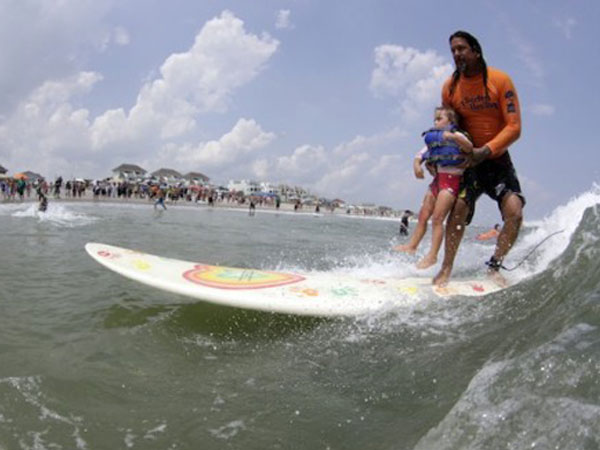
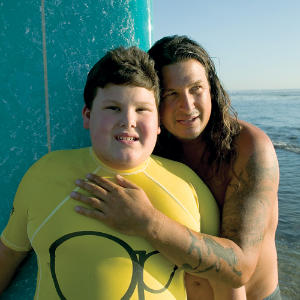 Surfer Izzy Paskowitz, son of the legendary surfer Doc Paskowitz founded the organization Surfers Healing after his own son was diagnosed with Autism. Surfers Healing helps autistic children to connect to the ocean and surfing by providing one day camps around the country that bring professional surfers together with the kids to teach them how to get up on the board and surf. Paskowitz discovered that being in the ocean and working with professional surfers has a calming effect on many autistic children that is therapeutic and helps to counter their sensory overload. Izzy stopped by the SiriusXM studios recently to talk about Surfer’s Healing as well as his new book, “Scratching the Horizon: A Surfing Life.” Excerpts of the interview appear below.
Surfer Izzy Paskowitz, son of the legendary surfer Doc Paskowitz founded the organization Surfers Healing after his own son was diagnosed with Autism. Surfers Healing helps autistic children to connect to the ocean and surfing by providing one day camps around the country that bring professional surfers together with the kids to teach them how to get up on the board and surf. Paskowitz discovered that being in the ocean and working with professional surfers has a calming effect on many autistic children that is therapeutic and helps to counter their sensory overload. Izzy stopped by the SiriusXM studios recently to talk about Surfer’s Healing as well as his new book, “Scratching the Horizon: A Surfing Life.” Excerpts of the interview appear below.
* * *
Ron Bennington: I was talking about your book, “Scratching the Horizon: A Surfing Life”. You lived an alternative life from any of your peers and probably anybody else that I’ve ever talked to before.
Izzy Paskowitz: Yeah, you know, there’s a lot of interesting people out in this world. But what we did– what my dad did in taking us on this insane journey and always involving surfing and kind of being healthy and being a tight knit family, was absolutely fucking amazing. Every day, for a few seconds when I lay my head on my pillow I always think about some of the things we did and the places we went to, and the things we saw that were amazing. From going straight from Hawaii hanging out with just legendary surfers back when Duke Kahanamoku— was still alive and Chubby Mitchell, the real original royalty of surfing. To be kind of involved with that as my dad being kind of this Polish guy and my mom being this big tall Mexican. We kind of just fit in Hawaii. From there he just decided that he wanted to keep our family as close as possible– I mean literally living in that camper. Our first stop was Israel and we lived there for a couple of years and being very much Jewish. My dad was in World War II. He’s 92 years old. So he wanted to be that father and move to Israel and help with the repopulation and all these strapping boys that were gonna assist in the country of Israel, until he started seeing all these boys die. And then– “I’m going to change my plan.” He was always able on just the turn of the key to say “alright that’s it we’re out of here. We’re moving back to the beach and we’re going to live in the camper. We’re going to travel from California down to Cabo.” In the 70s when there was nothing. Nowadays it’s illegal. Somebody would find you and throw you in jail. Or you’d just have groups– sympathizers and passive aggressives and weirdos and college kids saying “You can’t do that! That’s uncool or that’s neglecting your children.” But it was an amazing journey.
Ron Bennington: But what he gave his kids is experience. Experiences that you guys had that opened you up to the world and experiences that most people would save money for years and years and have that long weekend or have that week getaway.
Izzy Paskowtiz: Yeah, it was constant. But with that, the consistency of that– the plan– the experience my dad had– it was dangerous and it was full of excitement. And even danger that we were unaware of. Living in Israel, and my brother Salvadore, we’re all out there swimming some great little waves. My dad brought the very first surfboards to Israel in the 50s, where they confiscated them and said this must be some water to land anti-night submersible or whatever. So they drilled holes through it and stuff. Yeah but when we were kids, we would play around the beach. And one day, Sal being so young, he screamed and he hit a pitch, that this attack dog and these two Israeli soldiers– when he was just sitting on the beach getting a tan– attacked Sal. And put him underwater and he could have been killed. Just kind of wild…
Ron Bennington: That kind of stuff was going on.
Izzy Paskowitz: Yeah it would go on all the time. We would walk on the beach and find shit. Find bullets. We lived in Ulpan for a little bit, like a Kibbutz. And me and Jonathan and Abraham went out to one field that had these really cool skull and crossbone signs in red, I think that meant don’t go in there but that was just inviting us to go in there. Jonathan brought back a land mine and I had these 50 cal rounds, and Abraham had a hand grenade, and they said “Paskowitz, you’re fucking out of here.” So we ended up on the beach and then my dad had no job. And he says, “Well, I’m accredited as a doctor, graduated from Stanford, and I was a lifeguard when I was like 16, back in 1936″ so he was a lifeguard. So they gave us a couple armed guards that would come down every day. And this was back in the late 60s– it’s still war torn Israel. We’d sit on the beach when the sun was set and would see tracer fire.
Ron Bennington: I want to talk a little bit too about Surfers Healing. It’s surfershealing.org. How did you come to the understanding that you did about autism and the surf?
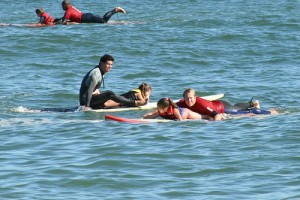 Izzy Paskowtiz: I didn’t know shit about autism. And I was really devastated with the diagnosis of my son. That was at about 3 years old. Isaiah had the kind of regressing autism where he developed completely normally. And had incredible language– a vocabulary, maybe 50 words and he was really progressing and connecting and he was so freaking beautiful. He was blond hair and had the most beautiful face and I called him prince because he was just my little prince. And fuck, it took me a decade to get over that, but my wife was right on it. And I had always been a surfer. You know, that’s what my dad gave me, was surfing and I was very good at it. Long boarding was my specialty; riding the nine foot boards. So I would take my family with me to surf contests. So one event in Hawaii– when Isaiah was like freaking out– this was like a world championship. Me and my wife have been married 25 years now, and I can see in her face she’s embarrassed and Isaiah’s just freaking out screaming and running around. And nobody knew what was going on. I felt so like we were on a different planet. He was like a Martian. And I threw him in the water like I was gonna fucking drown him. And when he popped up he was smiling and he had stopped crying. So I think that connection with the water was always there, and it was so stupid that it was right under my nose and I never did anything about it. And then after that Hawaii trip, I bought a big board– a tandem board built for two people– and we would go out all the time when he was just a little guy. And now, he’s 21 years old and he’s six three and he’s three hundred pounds. But the water and being in the water is an element that’s really calming.
Izzy Paskowtiz: I didn’t know shit about autism. And I was really devastated with the diagnosis of my son. That was at about 3 years old. Isaiah had the kind of regressing autism where he developed completely normally. And had incredible language– a vocabulary, maybe 50 words and he was really progressing and connecting and he was so freaking beautiful. He was blond hair and had the most beautiful face and I called him prince because he was just my little prince. And fuck, it took me a decade to get over that, but my wife was right on it. And I had always been a surfer. You know, that’s what my dad gave me, was surfing and I was very good at it. Long boarding was my specialty; riding the nine foot boards. So I would take my family with me to surf contests. So one event in Hawaii– when Isaiah was like freaking out– this was like a world championship. Me and my wife have been married 25 years now, and I can see in her face she’s embarrassed and Isaiah’s just freaking out screaming and running around. And nobody knew what was going on. I felt so like we were on a different planet. He was like a Martian. And I threw him in the water like I was gonna fucking drown him. And when he popped up he was smiling and he had stopped crying. So I think that connection with the water was always there, and it was so stupid that it was right under my nose and I never did anything about it. And then after that Hawaii trip, I bought a big board– a tandem board built for two people– and we would go out all the time when he was just a little guy. And now, he’s 21 years old and he’s six three and he’s three hundred pounds. But the water and being in the water is an element that’s really calming.
Ron Bennington: Has any psychiatrist looked into this? Or anybody who has done any kind of brain work? Do they know why being in the water….? Have they figured out what that does for autistic kids?
Izzy Paskowitz: You know it’s so typical. Everyone wants to discourage if they can’t quantify something, “Where are the stats? Does this even mean anything?” Bryant Gumbel said on this beautiful piece that we did…”do they have any proof any paperwork?” Well fuck the paperwork! You can’t believe in something or take it on faith that this really works when we’ve been doing this for fifteen years? And I’ve seen more autistic children than any doctor in the world probably. You’re going to discount me just because I don’t have a piece of paper that shows statistics? The water is an absolute healer. It definitely makes you feel good and these kids have sensory issues. I think my son– being such a big guy– the water makes him feel weightless and makes him feel comfortable. It calms his frazzled nerves. It’s all of that. We wouldn’t be doing this for fifteen years if it didn’t work. I would never dishonor the pain that my son and other children with autism have gone through just by doing this.
Ron Bennington: What I think is great cause I’ve seen some of the stuff you’ve done– the way that the parents – cause the kids are out there with surfers an the parents are kind of back – it gives them a chance to kind of see their kids doing something too. To see their kids having those experiences and to go into it, there’s terror sometimes. There’s real fear. And you guys run right through it, you just barrel through it which I think is a gigantic part of the accomplishment.
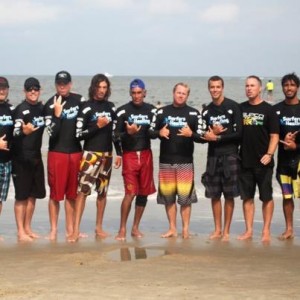 Izzy Paskowitz: Absolutely. And my guys– the North Shore guys and my two Puerto Rican instructors, and all the boys from California– some of really know almost like mixed martial arts moves to keep the kids on the boards. The point is, are you going to be one of those parents who protect our children too much to the point where he is going to start to scream and cry and they’re going to say “no, that’s it.” And I’ve done that. Last trip, in North Carolina a woman followed me in the water and my handler– he hands the child to me on the surf board, I lay him down, we paddle out and we start surfing and riding waves in. He said “hey, this mom wants you to come in.” And I turned my back to her. I apologized afterward because that’s her child, but I took him out, and after two or three waves, even four waves, it took him a little more time to calm down but he calmed down. He has to cooperate with me a little bit so I can stand up and I can stand him up. And that imbalance as you say, seeing those kids out in the water is incredible.
Izzy Paskowitz: Absolutely. And my guys– the North Shore guys and my two Puerto Rican instructors, and all the boys from California– some of really know almost like mixed martial arts moves to keep the kids on the boards. The point is, are you going to be one of those parents who protect our children too much to the point where he is going to start to scream and cry and they’re going to say “no, that’s it.” And I’ve done that. Last trip, in North Carolina a woman followed me in the water and my handler– he hands the child to me on the surf board, I lay him down, we paddle out and we start surfing and riding waves in. He said “hey, this mom wants you to come in.” And I turned my back to her. I apologized afterward because that’s her child, but I took him out, and after two or three waves, even four waves, it took him a little more time to calm down but he calmed down. He has to cooperate with me a little bit so I can stand up and I can stand him up. And that imbalance as you say, seeing those kids out in the water is incredible.
Ron Bennington: What I love in the book is that you admit you weren’t ready for this– to be a father with these kinds of responsibilities. Your wife stepped up before you and started to take it on and recognize it. What was the thing that finally broke through you? That this is life now?
Izzy Paskowtiz: I think the self pity and being harmful to yourself and you’re avoiding the inevitable. It was a point where I just had to get over myself and stop feeling sorry for myself and stop drinking here and there too much, hiding that I was staying away, when I should have been home. “No I need to go to another pro-surf contest.” I’d hear Isaiah screaming in the background, [and think] “oh fuck get me to a bar right away.” That I was going to break up the family– not Isaiah– but I was because I couldn’t fucking be a man and say, “I’ve got to do this.” I’m still a very imperfect human being but I do my best to do what my mission in life is. And that is, family is first, and when it is allowed, when Isaiah is good, which he’s been insane good for a year. The first time I swear to God I’ve ever seen my son smile– really truly smile, and not every picture which all autistic families see, where it’s like the canned “okay smile!” and the teeth are open and the eyes are open but it’s so unnatural. He really smiles from his soul now. And I’m so blessed. My wife Danielle is out there and she lets me come here to be a part of our larger group, our larger family of other families of children with autism. To share this moment riding waves with these kids, that I know has to continue. I know it is so important. And I see the impact, the imprint this has on the children, because it’s so freaking radical for that moment and we’re riding from terror and screaming. And it’s not really terror, it’s anxiety and getting over that anxiety to riding in– it’s absolutely beautiful to watch.
Ron Bennington: And it’s the same kind of anxiety anyone who has never done that would have only they’re expressing it differently. And for some reason in life we have to accomplish something before we get that feeling of peacefulness.
Izzy Paskowitz: Right, we take em out and we really surf. We’re not just cruising in a little white water. Some of the guys– Josh Tracy, and Garrett– some of the waves in New Jersey were freakin ten feet and Josh Wynn went out there, and they’re riding kids in the tube. And they’re such experienced surfers. My mission was, I wanted these children to be taken out by royalty. By all my ex competitors. And now we all have children, and they feel blessed that their children don’t have autism. I’ve got the most amazing group of volunteers who are past and even current professionals that help me out. So these children are taken out by just royalty– royalty of surfing.
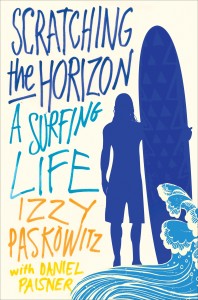
Ron Bennington: And this just keeps rolling getting bigger and bigger all the time.
Izzy Paskowtiz: Yeah we do twenty events from Hawaii to the West Coast, Puerto Rico, down to South Carolina up to Rhode Island and upwards of 200+ children per day. So it’s monumental but this is what I’m here for.
Ron Bennington: It’s really a lot of fun and the amazing thing about is the growth that you get to share once you’re open to– this is what I’m here for now . And I think everybody needs to get to that point to and once you stop battling against it, and just start to go with it, some phenomenal things can happen.
Izzy Paskowitz: And there’s some great people in this world who are really giving back. But there’s still the people who will try to beat you down and say “what are you doing taking your kids surfing with these pot smoking tattooed long haired surfers?”
Ron Bennington: But the reality is, who doesn’t want to hang out with those guys? “Scratching the Horizon: A Surfing Life: and check out surfershealing.org and get involved with it if you can. Izzy thanks so much man, it’s so great to have you in here and you’re a good dude and thanks for everything that you do. We’ll see you next time through.
* * *
=========================================
Follow Izzy on twitter @izzypaskowitz and @surfershealing and visit surfershealing.org.
You can hear this interview in its entirety exclusively on SiriusXM satellite radio. Not yet a subscriber? Click here for a free trial subscription.
.
You can learn more about Ron Bennington’s two interview shows, Unmasked and Ron Bennington Interviews at RonBenningtonInterviews.com.

